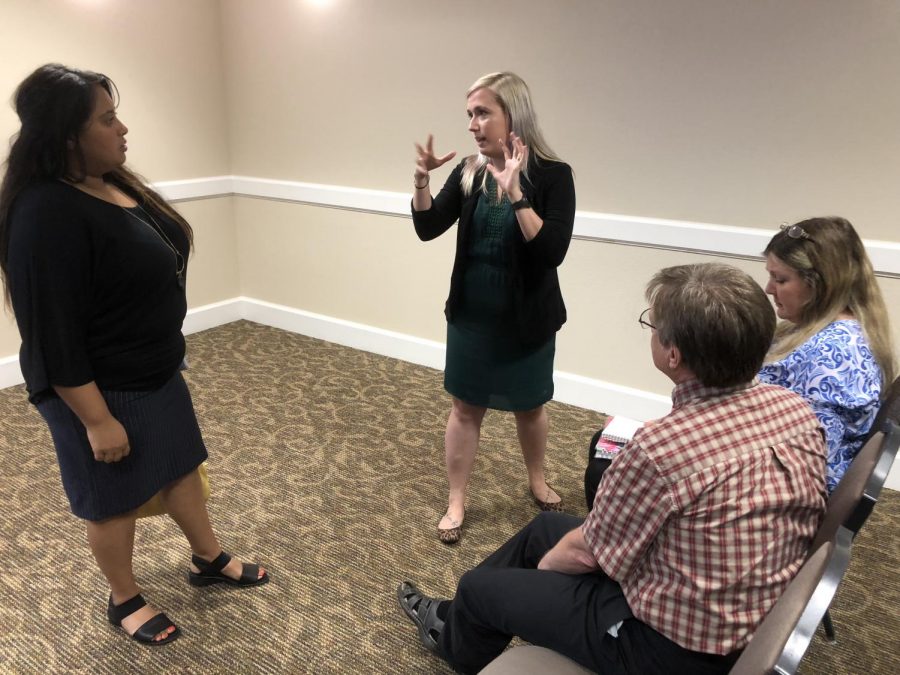New Title IX director charged with education enforcement
Rachael Fornof talks to faculty after a Title IX training. Photo by Bradley Wilson
Rachael Fornof started her new job in the fall of 2018 as director and coordinator of Title IX, and she hit the ground running. After a series of incidents the previous spring drew attention to the need for her position, she began offering required educational training. She even helped staff tables outside Clark Student Center last spring giving away T-shirts.
As Title IX director, her roles and responsibilities include running the office that investigates sexual misconduct and coordinating prevention programs.
Fornof said there were good foundations set, but the main goal was adding more programming throughout the year instead of just the month of April [sexual assault awareness month].
“We wanted to make sure we did more programming and reached a larger group of students. I also wanted to make sure that our greek life folks understood I would come talk to them personally since our greek students often deal with these types of things,” Fornof said.
The “Think About It” program is an alcohol education and sexual assault prevention program, and it must be completed prior to class registration for future semesters.
Fornof said the Violence Against Women Act requires all students to go through some kind of sexual assault prevention program and the Think About It program ensures all students get at least some information.
“The reason we liked the Think About It program and the online portal that you did, it was long but it was relevant. It wasn’t just talking to your parents about this kind of thing, it related it to the college student experience. Maybe it got folks to start thinking about this topic and realizing it does happen on college campuses,” Fornof said.
Since the main goal was to add more programming throughout the year, more prevention programs are already happening.
“We do different presentations. We bring speakers, and last semester we brought a group called No Zebras to campus and they did bystander intervention training. We have another individual coming in March to talk about sexual violence prevention and bystander intervention. We also do flyers in bathrooms that talk about stalking and sexual violence,” Fornof said.
Fornof, whose total compensation is $94,640, said faculty also went through a responsible employee training which gave them basic information about what to watch for and what to do if a student reports an assault to them.
“Some of the Title IX investigators are faculty members, so we’ve got faculty members all over campus who are partnering with Title IX to make sure that from their perspective, they are reaching students,” Fornof said.
According to Rape, Abuse and Incest National Network 11.2 percent of all students experience sexual assault through physical force, violence, or incapacitation. Among undergraduate students, 23.1 percent of females and 5.4 percent of males experience rape or sexual assault through physical force, violence, or incapacitation.
Cynthia Hubbard, marketing junior, said completing the Think About It program was eye opening, and educational about assaults on college campuses.
“I think it is a program everyone should do, I mean it is required, but I think that it is good that it is required. You really do learn a lot,” Hubbard said. “Most students don’t know about Title IX, I didn’t know much about it or the factors it involved, until starting to work at the office of Student Leadership and Involvement.”
“Working in the office of Student Leadership and Involvement, I knew Rachael [Fornof] was going to be the new Title IX coordinator, and after learning more about what that includes, I think Racheal does a really good job at that position,” Hubbard said.
Amelia Ecevido, biology senior, said that having to participate in the Think About It program made her realize it is good to have open conversations.
“My sorority had the Title IX director come to one of our meetings and she talked on the topic of assault. It is important to make sure to help my peers out and to let them know that it is okay to openly talk about it if necessary,” Ecevido said.
Omega Delta Phi and Tau Kappa Epsilon put on a consent talk with Fornof on Feb 12.
A member of Omega Delta Phi, David Brown, criminal justice junior, said it is important to educate people in case they ever get caught in a situation where they need help.
“A lot of people might get confused or don’t know who to talk to, so having a refresher on campus will definitely help people out in these situations,” Brown said.
According to Rape, Abuse and Incest National Network only 20 percent of female student victims, age 18-24 report to law enforcement. Knowing most assaults go unreported, it is important to make students feel safe enough to report on campus or to local police.
Marina Candelaria, radiology senior, said she would feel safe reporting an assault on campus if needed.
“Assuming something happened that needed to be reported, I would feel comfortable reporting to someone on campus, probably going to the police department or residence hall directors, depending on where it happened,” Candelaria said.








